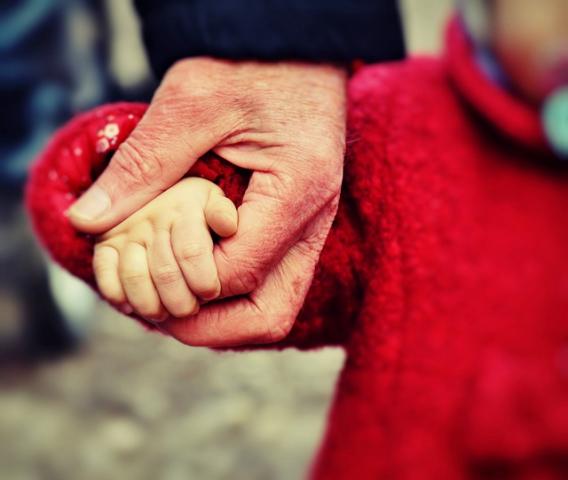Vicki Nelson writes about creating the space to learn about simplicity, generosity, and stewardship.

It was a chilly January afternoon when 15 parents and at least as many kids under the age of 11 shuffled into Knox-Metropolitan United Church in downtown Regina. My kids and I were there for a semi-regular meet up of the Spirituality & Parenting group. The pandemic had halted these gatherings, but we had recently started meeting again, this time exploring an anthology called The Sandbox Revolution: Raising Kids for a Just World, edited by Lydia Wylie-Kellermann.
Each chapter in the book contains one writer’s experiences with a theme – like patriarchy, the education system, or where to live – as people of faith and as parents. Each adult group member takes turns facilitating a conversation on a chapter with the others gathered. The kids go to a different room to play games and do crafts with some young adults from the nearby United Church summer camp, and the adults get to the hard work of sharing how we have bumped up against the topic in our own lives and parenting, unpacking the baggage we carry, and listening to others for ideas, support and inspiration.
January was my month to host, and because I have a reputation for encouraging budgeting and conscious spending – and maybe because I work in stewardship support in the United Church – I chose the chapter “Money: Nurturing a Family Culture of Generosity,” by Susan Taylor.
The group shared stories of their upbringing: some raised in homes where scarcity was the norm, others raised in homes where lavish spending was a daily occurrence, still others raised in homes where money was considered sinful and faith dictated a vow of poverty, and everywhere in between.
One shared reality was that money is on everyone’s minds right now. Inflation is skyrocketing, and at the end of 2022, Bloomberg News reported that Canadians held $722.6 billion in non-mortgage debt (that’s about $19,000 for every person (including children) in the country. And, according to The Globe & Mail, the age bracket with the highest debt levels is folks aged 36 to 55 (the age of the parents gathered in that room).
Our conversation that day didn’t dwell too long on our personal finances. Instead, it steered towards our dissatisfaction with colonial capitalism. We felt like this system has left us without a positive, shared understanding of generosity, hospitality, and other community norms. We are taught to value self-care and self-preservation, and that it’s virtuous to accumulate wealth and to create the best life possible for us and our immediate family. For me and others in the group, the colonial idea of “looking out for number one” feels quite removed from the hopeful, generous community we want to live in.
Some folks reflected on times when they have lived in different cultures, where intergenerational wealth transfers were nonexistent, and instead wealth was expected to be continually invested in the community: you care for people, and they care for you. Investments than can’t be tracked in a ledger or traded on the open market.
So where did this leave us? It left us wanting to dig deeper into alternative ways of living that would leave this world better for our children. We dreamed about intentional communities, of sharing more meals, and diffusing more of our money into our community now, rather than when we feel we have “enough.” We realized that under the empire of colonial capitalism, both simplicity and generosity – concepts Jesus spoke about regularly – are counter-cultural and even revolutionary.
And I think that’s where the Church should come in. Children, and especially their caregivers, need a revolutionary training ground. We need a third space that can’t be bought into, where commitment to learning in community is central, and where generosity, simplicity, and hospitality are taught and modeled. United Churches have this in our DNA, and although consumerism is loud in our ears right now, we have the tools and history to offer the world an alternative.
If you are a leader in your community of faith a few questions for you to consider: How is wealth, generosity, simplicity, and mutual aid spoken about in your community of faith? Do children and young people in the congregation have places they can share their time, ideas, skills and money? Is generosity thought of as transactional or as disciple making? If not, how will you shift this understanding?
If you want to keep thinking about gratitude and generosity, reach out to the Stewardship Support Team to learn more about our programs.
by Vicki Nelson, Community of Faith Stewardship Support for Pacific Mountain, Chinook Winds, Northern Spirit, Living Skies and Prairie to Pine Regions of The United Church of Canada.
The views contained within these blogs are personal and do not necessarily reflect those of The United Church of Canada.